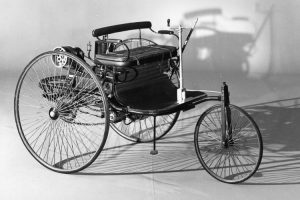
I’ve never been afraid to seek advice, particularly when it comes to legal matters, health care or buying a car. Several weeks ago, I raised the challenge of buying an electric or hybrid car in front of some knowledgeable friends. I play summer hockey with a group of men almost all of whom have worked in the automobile industry all their lives. When I asked what make and model of electric or hybrid car I should consider, just about all of them had the same answer:
“Within a year or 18 months,” they said, “they’ll all be making EVs (electric vehicles) of some sort. Not just Tesla, Toyota and Hyundai. Everybody.”
My wife and I have contemplated what direction we might take in the purchase of our next car, when one or both of our two Japanese-manufactured gas-powered cars expires. I was surprised to learn that the internal combustion engine has been around for over 150 years.
According to Google, Belgian inventor Étienne Lenoir used a turpentine derivative fuel to power the engine on his three-wheeled “hippomobile” in 1863; he got about nine kilometres on the tank of fuel driving from Paris to Joinville-le-Pont and back. And we’ve been hooked on gas-fuelled engines ever since.
One of the experts there in the hockey dressing room later sent me some links to sites explaining the concepts and technology of both fully electric and hybrid cars (vehicles that have the facility to function on battery power or gas power).
He pointed out that not only are such cars leading the curve toward Canada’s carbon-neutral environmental targets, but the government (not the province, but the federal) is also offering rebates (up to $2,500) depending on whether you’re leasing or financing the purchase.
On my own, I searched out a number of websites exploring the pros and cons of both electric and hybrid vehicles. Naturally, you have to recognize who is actually providing the assessment. According to the Electric Vehicle Society, fully electric cars offer the best driving experience, added safety (because battery packs give the car added rigidity), greater reliability (gas cars have 2,000 moving parts, electrics about 20), cheaper maintenance and higher resale value.
On the con side, EVS admits the upfront purchase price is prohibitive; an American site claims the next generation of electrical vehicles will sell in the $35,000 range (that’s nearly $45,000 Canadian).
But here’s the big question for fully electric models: How can I be sure I’ll make it out and back on one charge? Or, can I depend on finding enough recharging centres? An expert I heard on CBC claimed the projected 50,000 charging stations across Canada need to be 50,000 across Ontario in order to make EV driving in this province as convenient as driving our old gas guzzlers.
On the hybrid side of the ledger, the facility to go either way makes the charging-station availability a non-issue – when the battery runs dry, the gas engine kicks in and gets you home. Another of my hockey pals said he drove to Ottawa and back with his hybrid on less than a quarter tank of fuel.
Hybrid engines, says Economical, the Canadian insurance company, aren’t responsible for running the vehicle on their own, so hybrid engines tend to be smaller, lighter and more efficient. On the downside, hybrids still emit harmful emissions; their engines have a higher up-front cost; if you drive longer distances, you’ll still end up consuming a lot of gas to keep the battery topped up; and, a common problem apparently, hybrid engines don’t accelerate as well as gas engines or offer the same kind of driving experience.
A case in point. Last fall, I travelled to Alberta, rented a car and discovered in the parking garage it was a hybrid. I was excited at the prospect of acquiring first-hand knowledge. I was surprised how well it handled, how little fuel it consumed, and how similar it felt to my exclusively gas-powered car back home.
There was one problem, however. One time when I parked the car, got out, shut the door and tried locking the car with the fob-key, it wouldn’t respond. I tried it a second time, and no matter how hard I pressed the fob button, the car wouldn’t lock. I asked a guy for help in the parking lot.
“Did you turn it off?”
“How can you tell?” I asked in my ignorance. “There’s no sound!”
“You’re new at this,” the guy observed.
I nodded. When you’ve driven a gas-powered car all your life, trying to save the planet with an electric or hybrid car takes some getting used to.